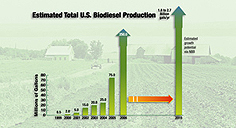Investor News
Investor RelationsBiodiesel
One of the ways to make driving more sustainable is to reduce the world's dependence on non-renewable resources. By developing vehicles capable of running on renewable fuels, such as biodiesel, we're addressing concerns about the environmental impact of driving.

Biodiesel
In the United States, biodiesel is primarily made from soybeans. It's typically sold in blends using 2 to 5 percent biodiesel (the remaining 98 to 95 percent is traditional petroleum-based diesel). These blends are called B2 or B5.
Most diesel vehicles can use B2 or B5. Diesel vehicles have been successfully operated on B20 and B100, but this is not recommended unless the vehicle's fuel system has been modified and the fuel quality controlled.
Biodiesel can also be made from waste cooking oils and animal fats, but the resulting fuel is problematic due to the wide variation in properties from these waste streams.
Benefits of Biodiesel
The use of biodiesel has several benefits:
- The production and consumption of biodiesel fuel reduces emissions of CO2, a contributor to global warming.
- Building a stable market for biofuels strengthens the farming economy and lessens our dependence on foreign petroleum exports.
Biodiesel Challenges
When comparing fuel properties, biodiesel presents some significant challenges that must be overcome before it can be widely used at high concentrations:
- At high temperatures, biodiesel can oxidize if air is present, causing the formation of acids and solids, which can corrode and plug fuel system components. Additives can help prevent this deterioration.
- Much as vegetable oils become cloudy in the refrigerator, biodiesel will form wax at cold temperatures. These wax crystals plug fuel filters, so flow-improving additives are necessary in cold weather.
- Biodiesel tends to carry water into the vehicle fuel system instead of shedding it in the water separator, which leads to further fuel system corrosion. This issue can be addressed through proper fuel blend formulation and vehicle development.
- Biodiesel crops yield comparatively less energy per unit of crop area than that available for ethanol crops.
Expanding Biodiesel Use
To allow for more extensive use of biodiesel, we're working with other manufacturers and fuel providers to address concerns related to use of higher biodiesel concentrations and establish national and international specifications for biodiesel quality.
When biodiesel fuel quality can be controlled, we expect that controlled fleet operations will be able to switch to next-generation biodiesel-capable vehicles.
We're conducting research with Michigan State University to discover potential fuel-processing steps to improve the properties of biodiesel. If successful, this research will open the door to more extensive use of biodiesel.
Investor News
-

Ford Motor Company’s August Sales Up 11 Percent; Ford Brand Cars, Utilities, Trucks Increase, Along with Lincoln
September 01, 2011 -

Ford, Toyota to Collaborate on Developing New Hybrid System for Light Trucks, SUVs; Future Telematics Standards
August 22, 2011 -

Ford Continues China Expansion, Sales Up 13% This Year
August 11, 2011 -

Ford Drops Price of SYNC by $100, Making Hands-Free, Voice-Activated In-Car Connectivity More Affordable, Available to All
August 01, 2011
Financial Reports
 Annual Report 2010
Annual Report 2010
|
FLIP-BOOK* | |
|---|---|---|
| Flip-Book | ||
| *Interactive flip-book format requires Flash Player |
||
- Investor Resources
- Contact Us




